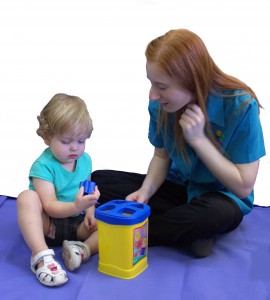
Here are our top ideas for developing language skills. This was one of our most popular posts so here it is again if you missed it with some extra links to helpful information and activities. If you are waiting for an assessment or therapy to begin, or if you just want to help your child’s development every day, here are some simple things you can do that make a real difference to your child’s language skills.
1. Talk together every day. Talk to your child whenever you can, as you go about daily activities like cooking, bathing, dressing, eating, travelling to kindy or school, getting ready for bed.
2. Get down to your child’s level. Ensure your child can see your face when you are talking to them. This helps them focus, lets them see and hear your words better and encourages them to copy you.
3. Follow your child’s lead when you talk. Take some time to see what holds your child’s interests. Watch what they look at, touch, hear and reach for and talk with them about these things. Follow your child's lead when you play too.
4. Talk about what you are doing and ‘think out loud’. Talk in simple words about what you are doing as you do your daily activities to develop your child’s vocabulary. “I am cutting carrots into circles”.
5. Be positive. Use lots of encouragement and tell your child what they have done well. Use specific words. “I like the way you used your words to ask for that”. “The red colour in that picture looks great”.
6. Model new words. Tell your child the names of things they have not seen before. Teach them new action words when you do things together. Teach them describing words by talking about what they see, hear, touch, taste and smell. Include words about size, shape, colour and feel.
7. Recast your child’s errors to help with developing grammar skills. If your child makes a mistake when talking, repeat the sentence, fixing the mistake to show them the right way. Use a positive tone and repeat it a few times but keep it natural. E.g. Child “I runned”. Adult “Yes you ran, you ran very fast, you ran right to mummy”. Try repeating this same word a few more times later on, so your child gets lots of chances to hear it the right way.
8. Use lots of repetition. Young children learn though repetition. Repeat new ideas, words and concepts over and over. Repeat stories and songs too. Repeat new words and ideas in different places, times and situations to help your child learn the full meaning and understand different ways the word can be used.
9. Read lots of books together. Reading to your child is one of the best things you can do to help them learn. Make it a part of your day every day. Read new books but also old repeat old favourites. Choose books which suit your child’s age, language level and interests. Talk about what you read and ask your child questions. Books are also great for developing early literacy skills too.
10. Embrace new experiences. Try new places, games, songs, books and activities with your child. Do something special and different every chance you can as this opens up new words, ideas and concepts to talk about.
If you are concerned about your child's language skills have a look at our checklists to see what to expect for your child's age. If you are still concerned browse our website to see how speech pathology can help.
Related posts:
Receptive language
Language Games
Developing vocabulary
Developing concepts
All about questions
Related Blog Posts
If you liked this post you may also like:
Using SNAKES & LADDERS To Grow
Visuals for preschoolers
Developing writing while on school holidays
Using MONOPOLY to Grow



